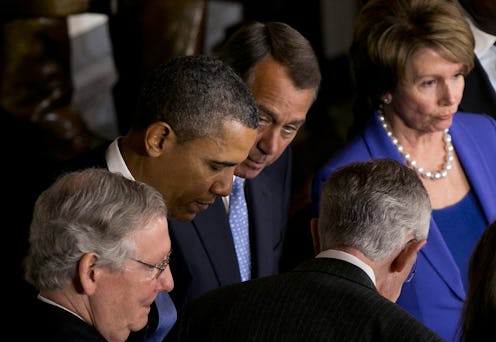News
House Leaders Say They Support Syria Intervention
Well, it looks like a strike in Syria is increasingly likely. Congressional leaders said Tuesday that they will support President Obama in his call for military action in Syria. When they get back from vacation, that is.
After meeting with the president, House Speaker John Boehner, (R-Ohio) told reporters Tuesday,"I am going to support the president's call for action.” The move comes after the president said this weekend that he would seek congressional approval before moving ahead with a strike against Syria.
Despite criticism by some representatives within the Republican party, Boehner voiced agreement with the Obama that a "red line" had in fact been crossed. “The use of these weapons has to be responded to,” he said. The move to support the president was echoed by other political heavyweights who participated in Tuesday's meetings, including House Majority Leader Eric Cantor (R-VA) who said that he'd vote to approve a strike in Syia, with even liberal House Minority Leader Nancy Pelosi (D-California) saying "we must respond.”
Meanwhile, Syria's President Bashar al-Assad issued both a warning and a challenge to the U.S. and France Monday.
In an interview with the French newspaper Le Figaro, Assad pushed Western countries to release any alleged evidence that he had been involved in the use of chemical weapons during an attack that reportedly killed over 1,000 people. "Whoever accuses must provide proof. We have challenged the United States and France to provide the slightest proof," he said.
But Assad didn't stop there. He went on to make the case that government involvement in an attack that reportedly injured some of its own soldiers is far-fetched. Assad also spoke strongly about Syria's rebel forces, saying that 80 percent to 90 percent of them were "terrorists." "The only way to deal with them is to annihilate them. Only then will we be able to talk about political measures," he said.
Assad called for France to back off plans for a coordinated airstrike against the country, lest it become an enemy to Syria. When it comes to the United States, Assad called President Barack Obama "weak."
"Whoever contributes to financially or militarily to bolstering terrorists is an enemy of the Syrian people. Whoever is against the interests of Syria and its people is an enemy," Assad said.
One day after Assad's colorful interview, Israel says it conducted a successful missile test in the Mediterranean, where U.S. warships sit ready to carry out a punitive strike against Syria.
On Monday, the United Nations reported that the number of refugees fleeing Syria since violence erupted in March 2011 has reached two million people, with no signs of slowing down. More than half of the refugees are children. The United Nations estimated that about 5,000 Syrians per day exit their country in search of a more peaceful existence. The organization noted that while neighboring countries have been welcoming, so many displaced people could eventually take a serious toll on host countries.
An awkward photo of Secretary of State John Kerry and his wife having a swanky dinner with the Assad's back in 2009 is also going viral.
Just in 2011, Kerry praised Assad as "a very generous man." On Monday, Kerry accused Assad of committing a "cowardly crime" and committing a "moral obscenity," reiterating that he believes there is clear proof the leader used chemical weapons on his own people.
As plans for a U.S. strike on Syria remain unclear, Boehner is reportedly open to the idea of calling Congress back early from recess to vote on the use of military force. “The speaker hasn’t ruled it out,” according to a spokesman, Michael Steel. But it would take more than just Boehner to pull Congress out of recess. Senate Majority Leader Harry Reid, D-Nev, would also have to be willing to call the Senate back.
The White House will be busy this week looking for support both at home and internationally. While Syria's allies, Russia and China, have stood by Assad, for the United States, allies have been more difficult to come by. President Obama will meet with Congressional leaders, while Kerry and Secretary of Defense Chuck Hagel will make the case for military action in front of the Senate Foreign Relations Committee.
